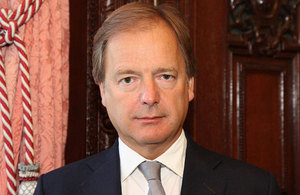Hugo Swire responds to letters on political prisoners in Burma
Foreign Office Minister Hugo Swire has responded to members of the public concerned about political prisoners in Burma.

Hugo Swire
Thank you for the hundreds of letters and emails sent to the Foreign Secretary in recent weeks about political prisoners in Burma. I am replying both as Minister responsible for our relations with Burma, and as someone who shares your concerns about this.
The cause of political prisoners has long been one the UK has championed, and it is one that we continue to raise at the highest levels. Both the Prime Minister and the Foreign Secretary discussed political prisoners with President Thein Sein, alongside the full range of our concerns on human rights and ethnic issues, during the President’s visit to London in July 2013.
I warmly welcome the release of many hundreds of political prisoners under this Burmese government. It is important that we commend positive steps as much as we draw attention to areas of continuing concern. But I do of course remain very concerned about those who remain in jail, including recognised prisoners of conscience such as Dr Tun Aung and Kyaw Hla Aung. We will continue to emphasise to senior members of the Burmese government that even one political prisoner is one too many.
On my most recent visit to Burma in January, I urged continued dialogue between the government, political parties, ethnic armed groups and civil society to resolve these remaining cases as a matter of urgency. I have also lobbied directly on individual cases – for example raising the detention of Dr Tun Aung and Kyaw Hla Aung with the President’s Office.
We remain deeply concerned by credible reports following the 2012 violence in Rakhine State of mass arbitrary detentions, torture of detainees, and trials which did not follow due legal process. These have not been addressed. We will continue to call for a comprehensive and transparent mechanism to review existing cases and to support the reintegration of former political prisoners.
We also continue to call on the government to ensure that democratic activists are able to voice their opinions freely and without fear of arrest, and to emphasise the importance of press freedom in a democracy. The recent detention of journalists, arrested in the course of carrying out their work, highlights that there is still work to be done. I urged the Speaker of Parliament to repeal those laws which are not in line with democratic standards. As many of you noted in your letters, repealing these repressive laws will be vital if Burma is to continue on its path to greater democracy. We will also continue to encourage constitutional change in order to support the growth of independent and effective judicial systems.
We are strong supporters of the transition in Burma and we welcome the progress that has been made. However, we are under no illusion as to the scale of the challenges that remain. Our Embassy in Rangoon remains in close contact with the Assistance Association for Political Prisoners (Burma) and other civil society networks in support of their work to identify and advocate for those that have been unjustly convicted.
My speech in January at the British Council in Rangoon made clear the many concerns we continue to have on political prisoners and other human rights issues.
On 8 April, the British Government published UK Activities in Burma – a document which sets out for the first time the range of work in Burma being undertaken by the Foreign Office, Department for International Development, Ministry of Defence and UK Trade and Investment. It sets out the importance of Burma to the UK, our five key areas of work and the main activities we are doing under each of them.
If you require any further information, please consult the UK and Burma website, follow us on Facebook or Twitter: @UKinBurma
Thank you for your support in highlighting these issues in Burma. Human rights – not least the plight of political prisoners – will remain at the heart of British policy. We will remain a vocal advocate for change in Burma and continue to press for action to resolve what are issues of real concern.
Further information
A PDF version of the letter is accessible below